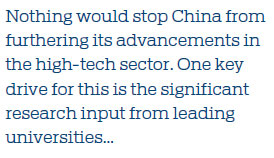A golden opportunity for future AI breakthroughs
Updated: 2019-01-11 06:09
(HK Edition)
|
|||||||
Conceivably, China's journey to become a sci-tech superpower won't be a smooth one. But nothing would stop China from furthering its advancements in the high-tech sector. One key drive for this is the significant research input from leading universities on the Chinese mainland and in Hong Kong. At the International Artificial Intelligence Summit held at the University of Hong Kong in late November, speakers lauded the remarkable progress China had made in developing artificial intelligence technology. Fields such as speech recognition, healthcare, transportation, manufacturing and financial services have already seen widespread adoption of AI to enhance efficiency, cost-effectiveness and customer services/experience. A vast number of data engineers, scientists, AI experts are hired by banks in China for wide-ranging virtual services, as well as for research and development.

Speakers at the forum predicted a world in which big data and robots will be used in almost all aspects of life.
Dubbed China's MIT, Tsinghua University co-organized the summit, at which its Dean of the Institute for Artificial Intelligence Zhang Bo called for greater collaboration among academic and industry to advance AI applications. He is not alone in seeing the tremendous benefits AI could bring to not just the economy, but also the well-being of society through smart equipment and systems taking advantage of knowledge derived from big data.
Of course, mastering and applying the technology in various fronts is a complex, daunting task. Institutional collaborations serve the vital purpose of linking up the best minds and resources. Hence HKU's Faculty of Engineering signed a memorandum of understanding recently with the Harvard John A. Paulson School of Engineering and Applied Science to set up a Laboratory for Instrumentation for Precision Medicine.
The Global Strategic Academic Partnership agreement signed recently between HKU and Tsinghua University adds to the already longstanding research ties between the two. Scholars from both institutions have jointly produced more than 700 research articles in the past five years.
Future advanced development also hinges on cross-disciplinary research. Some of the fundamental problems in machine learning call for knowledge in math and computer science, while computer science and engineering expertise is required to make robots smarter. To delve into the deeper realms of AI, expertise in neuroscience will be needed.
Hong Kong has much to contribute in both research and nurturing talents, promoting AI applications in diverse areas from dentistry, medicine, architecture to finance. Though a small territory, Hong Kong has earned international acclaim for its higher education, as shown by the relatively high international rankings enjoyed by local institutions. Hong Kong could play the role of a major training hub for AI talents for the Guangdong-Hong Kong-Macao Greater Bay Area and the broader region. This also requires support measures and provisions of resources from the Hong Kong government. Such support is likely to be forthcoming, given the government's commitment to develop Hong Kong into a smart city.
At HKU, we are stepping up research on blockchain - already playing an increased role in the financial sector - by establishing a new laboratory for fintech under the Department of Computer Science. Blockchain will be a major topic under investigation at the laboratory. We are prepared to collaborate with companies like the Mass Transit Railway Corporation with which we have just signed a memorandum of understanding to develop possible solutions for enhancing railway operation and maintenance engineering, employing cutting-edge methodologies including image analysis, forecasting, image and data visualization and big data analytics. The globally known railway operator will only be one of many companies in the future to capitalize on AI-driven systems.
HKU and Tsinghua will also launch dual bachelor's degree programs, one in business and economics, the other in computer science and technology, to nurture talents who can cope with the challenges of the future world.
The programs represent yet another example of inter-disciplinary training, which will be the norm in the years ahead. It is vital to nurture AI literacy among students from various disciplines, be it law, finance, social sciences or others.
Skeptics have raised concerns about cybersecurity, quality of mass data collected and encroachment of personal privacy in an AI-infused world. Such issues are not unique for AI. People are hooked to digital payment today and find the experience to be most gratifying despite knowing that the internet is not 100 percent safe and that computers have viruses. AI would not exacerbate the problem, but instead might improve the situation when technologies like blockchain are more widely deployed.
Others may be worried about a potential loss of jobs should robots or other machines become prevalent. That could happen, but the same worry happened hundreds of years ago at the dawn of the Industrial Revolution. One hopes that AI will bring forth new job types and redistribution of manual labor across a wide spectrum that will transform our society for the better.
Lying before us is a golden opportunity for further breakthroughs in technology and human life. Indeed, chances are high that China will emerge as a leader in the AI field by 2030, since it has all the necessary resources - capital in particular, and the abundance of data, talent, and government support at all levels. China is in a world-leading position already in many fronts, in particular, computing vision, deep learning, and robotics. Much of the work and achievements in these areas are application- and implementation-oriented in which China has had an upper hand, yet in terms of fundamental research in AI and advancing AI at the conceptual level, the US is still leading the way.
The author is a professor and dean of engineering at the University of Hong Kong.
(HK Edition 01/11/2019 page12)